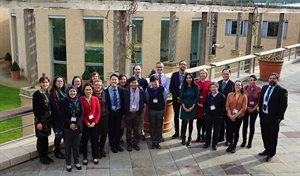A researcher from Brunel University London has been involved in the development of a new knowledge exchange platform that will encourage cross-disciplinary and cross-sectoral activities to promote sustainability.
 Dr Eleni Iacovidou, a lecturer in environmental management at Brunel University London, is the Head of Strategy of a new international society of Circular, Regenerative and Sustainable Systems (CRES). CRES was officially launched at the University of Oxford on 3 February 2020, hosted at Thatcher Business Education Centre, Saïd Business School.
Dr Eleni Iacovidou, a lecturer in environmental management at Brunel University London, is the Head of Strategy of a new international society of Circular, Regenerative and Sustainable Systems (CRES). CRES was officially launched at the University of Oxford on 3 February 2020, hosted at Thatcher Business Education Centre, Saïd Business School.
This global initiative is founded and led by Doctor Kok Siew Ng from Oxford’s Department of Engineering Science, together with an interdisciplinary team formed by a group of passionate academic researchers and industry practitioners. CRES is built upon the UK and international network from the SYNERGORS consortium which is funded by UKRI/NERC through the Industrial Innovation Fellowship programme. CRES has been established as a knowledge exchange platform to promote systems thinking and circular economy through a collaborative approach. Its vision is to create a supporting environment for cross-disciplinary and cross-sectoral activities that promote the development and implementation of innovative ideas to address complex global issues, using a systems approach. CRES has the mission of bringing together academia, industry, government and society in order to integrate systems thinking into decision-making.
Twenty-five representatives from the UK, Malaysia, Mexico, Thailand, Brazil and the Netherlands were invited to the launch event of the society to enable joint cross-disciplinary and cross-sectoral discussions, aiming to initiate conversation among different stakeholders to address global complex issues. A series of keynote seminars provided insights into a systems thinking approach, followed by a breakout session in the afternoon to understand how CRES could help address various challenges in sustainable development; what are the broad gaps in knowledge and expertise regarding circular, regenerative and sustainable systems; and to what extent systems thinking has been embedded in academic engineering degrees and in decision-making in industry, government and society.
“There is a pressing need to overcome the communication barrier across various disciplines and sectors as conventional approaches are not always effective in resolving problems,” said Doctor Ng, President of CRES. “Systems thinking is crucial in addressing global challenges such as resource management – we need to integrate our knowledge and expertise from various disciplines and sectors and solve the problems together at a global scale. ‘Continuity’ is the key in sustaining our research efforts and creating long-term impacts.”
Doctor Iacovidou added: “Being part of CRES, where we all share the vision of creating a supporting environment - one that can help us break down the boundaries between disciplines and sectors, reinforces our efforts to address complex global challenges via the use of a systems approach. This is the only way of unlocking key barriers to fundamental systems change, creating viable, sustainability pathways.”
CRES seeks to enable the re-invention systems to deliver a sustainable future and to address complex global issues, using a systems approach. It is about fostering a better understanding of the impacts of economic, political, and social systems, promoting the generation of environmental and social net-gains via innovation and exploration of new technologies, business models, policies and social practices.
To find out more and how you can get involved please email Dr Eleni Iacovidou on eleni.iacovidou@brunel.ac.uk
This article has been adapted from the original launch news article.
Reported by:
Lizzy Gooderham
Elizabeth.Gooderham@brunel.ac.uk